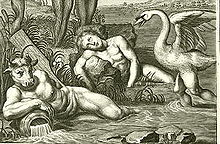Cycnus of Liguria

In Greek mythology, Cycnus (Ancient Greek: Κύκνος "swan") or Cygnus, was a king of Liguria.
Biography
Cycnus was the son of Sthenelus and the lover of Phaethon. (Servius explicitly writes "amator", or lover.) According to Ovid, he was a distant relative of Phaethon on his mother's side. Servius also mentions that Cycnus had a son named Cupavo.[1]
Mythology
After Phaethon died, he sat by the river Eridanos mourning his death. The gods turned him into a swan to relieve him of his pity. Even then he retained memories of Phaethon's death, and would avoid the sun's heat because of that.[2] Swans are known for mourning their mate for multiple days in case they died, which suggests that Cygnus and Phaethon were lovers. [3][4][5] According to Virgil, Cycnus lamented Phaethon's death till he grew old, so his gray hair became gray feathers upon his transformation.[6] Pausanias mentions Cycnus, king of the Ligyes (Ligurians), as a renowned musician who after his death was changed into a swan by Apollo.[7] Servius also writes of Cycnus as a musician and a friend of Phaethon, and states that he was changed into a swan and later was placed among the stars by Apollo (that is, as the constellation Cygnus).[1] Cycnus's talent of a musician motivates his association with the concept of the swan song suggested in Hyginus's account.[8]
References
- ^ a b Servius on Aeneid, 10. 189
- ^ Ovid, Metamorphoses, 2, 367 sqq.
- ^ Wedderburn, Pete. "Animals grieve just as people do". The Telegraph. Retrieved 25 July 2019.
- ^ "Lonely Irish swan 'hugs' cars after its mate was killed". IrishCentral.com. 22 October 2018. Retrieved 25 July 2019.
- ^ "The care and treatment of swans and waterfowl with an established worldwide reputation". The Swan Sanctuary. Retrieved 25 July 2019.
- ^ Virgil, Aeneid, 10. 189 ff
- ^ Pausanias, Description of Greece, 1. 30. 3
- ^ Hyginus, Fabulae, 154
